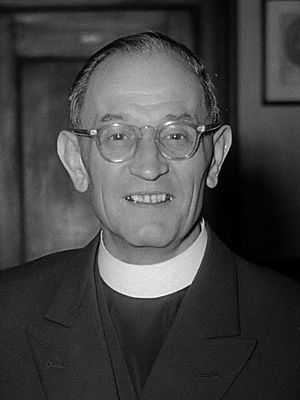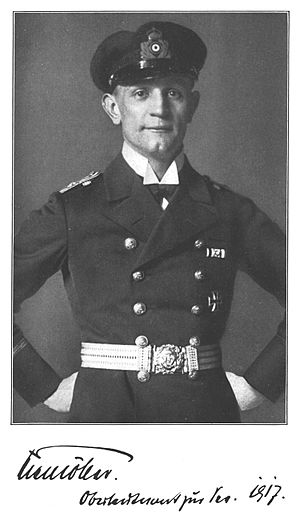Martin Niemöller facts for kids
Quick facts for kids
Martin Niemöller
|
|||||||||||
|---|---|---|---|---|---|---|---|---|---|---|---|

Niemöller at St. James' Church, The Hague,
in May 1952 |
|||||||||||
| Born |
Friedrich Gustav Emil Martin Niemöller
14 January 1892 |
||||||||||
| Died | 6 March 1984 (aged 92) |
||||||||||
| Alma mater | Westphalian Wilhelms-University | ||||||||||
| Known for | Co-founding the Confessing Church | ||||||||||
|
Notable work
|
"First they came ..." | ||||||||||
| Spouse(s) |
Else Bruner
(m. 1919; died 1961) |
||||||||||
|
|||||||||||
| Military career | |||||||||||
| Service/ |
Imperial German Navy | ||||||||||
| Years of service | 1910–1919 | ||||||||||
| Battles/wars | First World War | ||||||||||
| Awards | Iron Cross | ||||||||||
Martin Niemöller (1892–1984) was a German pastor and theologian. He is famous for standing up against the Nazi government in the late 1930s. He is also known for his powerful poem, "First they came ...". This poem reminds us to speak up when others are treated unfairly.
The poem has many versions. One well-known version says: "First they came for the socialists, and I did not speak out – because I was not a socialist. Then they came for the trade unionists, and I did not speak out – because I was not a trade unionist. Then they came for the Jews, and I did not speak out – because I was not a Jew. Then they came for me – and there was no one left to speak for me."
Niemöller first supported Adolf Hitler and his ideas. But he later became a leader of the Confessing Church. This group was against the Nazis trying to control German Protestant churches. He was put in Sachsenhausen and Dachau concentration camps from 1938 to 1945 for his opposition. He almost faced execution. After being freed, he deeply regretted not doing more to help victims of the Nazis. He changed his views and became a strong supporter of pacifism (peace) and anti-war efforts. He worked for nuclear disarmament and met with Ho Chi Minh during the Vietnam War.
Contents
Early Life and World War I
Martin Niemöller was born on January 14, 1892, in Lippstadt, Germany. His father was a Lutheran pastor. Martin grew up in a traditional family. In 1900, his family moved to Elberfeld, where he finished school in 1908.
He started his career as an officer in the German Navy. In 1915, he began serving on U-boats (submarines). He was a second officer on the submarine U-73. This submarine operated in the Mediterranean Sea. It planted mines and attacked enemy ships.
In 1917, Niemöller became a navigator on U-39. Later, he was the first officer on U-151. This submarine sank many Allied ships. In 1918, he became the commander of UC-67. Under his command, UC-67 helped close the French port of Marseille temporarily.
For his brave actions, Niemöller received the Iron Cross First Class. As World War I ended, he decided to become a preacher. He wrote a book about his journey called From U-boat to Pulpit. He left the navy because he did not agree with Germany's new democratic government.
Becoming a Pastor
In 1919, Martin Niemöller married Else Bremer. That same year, he tried farming but could not afford his own farm. So, he decided to follow his earlier idea of becoming a Lutheran pastor. He studied theology at the Westphalian Wilhelms-University in Münster from 1919 to 1923. He wanted to bring meaning and order to society through the church.
He was ordained as a pastor on June 29, 1924. He worked in Münster and later became a pastor in Dahlem, a suburb of Berlin, in 1931.
Standing Up to the Nazis
Like many conservative pastors, Niemöller initially supported Adolf Hitler when he came to power in 1933. Niemöller believed Hitler would bring a "national revival" to Germany. In his book, he called the time before Hitler the "years of darkness."
However, Niemöller strongly disagreed with the Nazis' "Aryan paragraph". This rule meant that people with Jewish backgrounds could not be part of the church, even if they had converted to Christianity. In 1936, he signed a petition criticizing Nazi policies. The petition said the Aryan Paragraph went against Christian values.
The Nazis responded by arresting many pastors. In 1933, Niemöller started the Pfarrernotbund. This group helped pastors who were being discriminated against for having Jewish family members. By 1934, Niemöller joined other Protestant leaders like Karl Barth and Dietrich Bonhoeffer. They formed the Confessional Church. This group opposed the Nazis' attempts to control German Protestant churches.
Niemöller's views were complex. While he opposed Nazi control of the church, he sometimes made negative comments about Jewish people. He protected Christians who were persecuted by the Nazis because of their Jewish heritage. But he also held some traditional anti-Jewish beliefs. Historians still discuss his exact feelings and actions during this time. Some see him as an opportunist, while others praise the risks he took against the Nazis.
Imprisonment and Freedom
Niemöller was arrested on July 1, 1937. In March 1938, he was tried for acting against the state. He was fined and given a seven-month prison sentence. However, he had already been held for longer than that. So, the court released him.
But the Gestapo, the Nazi secret police, immediately re-arrested him. He was sent to Sachsenhausen and later to Dachau concentration camp. He was held there from 1938 until 1945.
In April 1945, as the war was ending, Niemöller and other important prisoners were moved. The Nazi guards had orders to kill them if the Allies got too close. But German soldiers took the prisoners into their protection. Soon after, American troops freed Niemöller and the others.
Life After the War
After the war, Niemöller was not given "Nazi victim" status. He never denied his own mistakes during the Nazi era. In 1959, he wrote that his eight years in prison changed his life. He began to see things differently.
From 1947 to 1961, Niemöller was president of the Protestant Church in Hesse and Nassau. He helped create the Stuttgart Declaration of Guilt. This document admitted that German Protestant churches had not done enough to resist the Nazis.
In the 1950s, Niemöller became a strong pacifist and activist for nuclear disarmament. He was a leading figure in the German peace movement. He even visited Ho Chi Minh in North Vietnam during the Vietnam War. He also protested against the Vietnam War and NATO's military plans.
In 1961, he became president of the World Council of Churches. He received the Lenin Peace Prize in 1966. He gave a sermon at the dedication of a church at the former Dachau concentration camp in 1967.
Martin Niemöller died in Wiesbaden, West Germany, on March 6, 1984, at the age of 92.
Selected Writings
- From U-boat to Pulpit, including an Appendix From Pulpit to Prison by Henry Smith Leiper (Chicago, New York: Willett, Clark, 1937).
- Here Stand I! with foreword by James Moffatt, translated by Jane Lymburn (Chicago, New York: Willett, Clark, 1937).
- The Gestapo Defied, Being the Last Twenty-eight Sermons by Martin Niemöller (London [etc.]: W. Hodge and Company, Limited, 1941).
- Of Guilt and Hope, translated by Renee Spodheim (New York: Philosophical Library, [1947]).
- "What is the Church?" Princeton Seminary Bulletin, vol. 40, no. 4 (1947): 10–16.
- "The Word of God is Not Bound", Princeton Seminary Bulletin, vol. 41, no. 1 (1947): 18–23.
- Exile in the Fatherland: Martin Niemöller's Letters from Moabit Prison, translated by Ernst Kaemke, Kathy Elias, and Jacklyn Wilfred; edited by Hubert G. Locke (Grand Rapids, Mich.: W.B. Eerdmans Pub. Co., c1986).
- "Dachau Sermons", Martin Niemöller, translated by Robert H. Pfeiffer, Harvard Divinity School 1947 (published by Latimer House Limited, 33 Ludgate Hill, London EC4)
See also
 In Spanish: Martin Niemöller para niños
In Spanish: Martin Niemöller para niños- "First they came ..."
- List of peace activists
- Franz Hildebrandt
- Deutsches Historisches Museum
 | Frances Mary Albrier |
 | Whitney Young |
 | Muhammad Ali |


